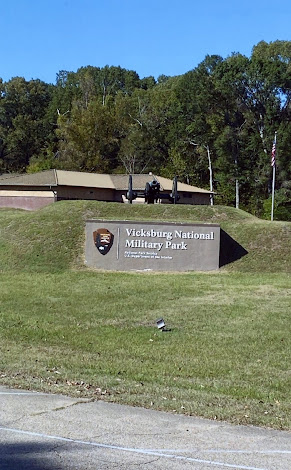On this trip down the Mississippi, I carried a small notebook and scribbled notes furiously. Visiting this national park, I was especially overcome by the enormity and importance of this battle. The notes are mine and the facts as I understood from our guide.

For nearly 200 years, men have been attempting to “tame” the mighty Mississippi River but “Mother Mississippi” has slapped back most all attempts through the years. Throughout history, the Mississippi has been a vital commerce and travel “highway” draining most all the American Midwest.
The river was of special importance during the Civil War. In 1837, Robert E. Lee was given the task of “taming” the Mississippi River. That meant he started clearing the floating trees and wrecked boats from the river. He was trying to clear a navigable channel, not clear the entire river. Lee pioneered the revetment for erosion control. This was putting “stuff” along the river bank to hold the bank. First was woven willow branches weighted with mud (today they use concrete slabs). Lee also introduced dredging.
All Mississippi River cities were originally ports for farmers to ship grain and other products. During the Civil War, the Mississippi River was all important………. For this reason it was the key to winning the Civil War. The Union strategy was to completely surround the Confederacy (why there were two armies, the Army of Virginia and the Army in the West). The plan for the Mississippi was to blockade all the posts and then go after the cities along the river, one by one.
Admiral David Farragut was sent upriver from New Orleans (which was Union held since April 1862) to bombard Vicksburg into submission but they would not surrender. Farragut was firing uphill and the town was firing downhill. The town did realize they would be attacked again so the troops and the townspeople began cutting trees and building up an eight-mile encircling defense for the east side, “sort of stacking Lincoln Logs,” thinking that would keep them safe. As would the bluff would keep them safe from river attacks. President Lincoln knew otherwise.
Quoting from a National Park brochure, “Vicksburg posed the most significant remaining obstacle to complete Union control of the Mississippi.” Vicksburg had to be taken; Grant was the man for the job. New Orleans was first, April 1862; it fell in one day. Memphis was next in June 1862; again in one day. Ditto with Baton Rouge. Natchez was next and it capitulated……. Many Northerners had settled there to profit from their hundreds of plantations, so they had lots to lose during a battle. Next upriver was Vicksburg.
Vicksburg sat on the eastern side of the river atop a high bluff on a hairpin turn of the Mississippi and Yazoo rivers. It was easy for Confederate Gen. John C. Pemberton to fire down upon any Union river-attempt to take the city from the river (as he had repulsed Farragut).
Memphis, east side of the river and north of Vicksburg was a swampy delta, nearly impossible for an army to march across. So Grant couldn’t come from the North. The Confederates held Jackson (state capitol to the east of Vicksburg). Pemberton was told by President Jefferson Davis to “hold Vicksburg at all costs.” So he dug in and did his best but Vicksburg did fall in the end.
((TO BE CONTINUED))
No comments:
Post a Comment